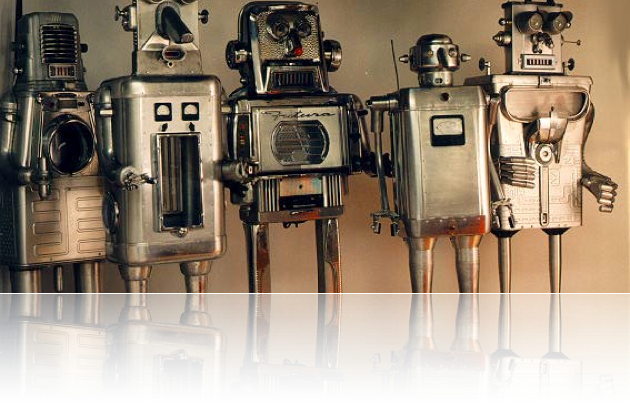Human-Robot Interaction


Course Syllabus
This course will cover a variety of topics related to social intelligence. We will spend 1-2 weeks on each topic, and readings/lectures will cover (1) what’s known about how this ability arises in human intelligence, and (2) state-of-the-art approaches to building computational systems with this type of social ability. Readings will be linked here, and you are expected to turn in a Summary & Critique by noon the day of lecture. Assignments and deadlines listed here are approximate and will be specified in detail on the Assignments page.

Tues, Jan. 8
First class, introduction

Thurs, Jan. 10

Week 1: Introduction & Social Robots Overview
Tues, Jan. 15

Thurs, Jan. 17
J. Lasseter, “Principles of Traditional Animation applied to 3D Computer Animation”, in Computer Graphics, 1987.

Week 2: Anthropomorphism & Design
Week 3 & 4: Intentions, Intentionality, and Perceiving other Minds
Week 5-7: Social Learning
Week 8-10: Collaboration and Teamwork
Week 13 & 14: Emotional Intelligence
Week 11
Week 12: Measuring HRI
Week 15:
Finals week
Tues, Jan. 22
Gergely Csibra, “Teleological and referential understanding of action in infancy”, Philos Trans R Soc Lond B Biol Sci. 2003.
optional reading: Woodward, et al., “How infants make sense of intentional action”, Ch7 in Intentions and Intentionality, Ed. Malle and Moses, 2001.

Thurs, Jan. 24

Tues, Jan. 29
S. Baron Cohen “Precursers to a Theory of Mind: Understanding Attention in Others” in Natural Theories of Mind (Ed. A. Whiten) 1993.

Thurs, Jan. 31

Tues, Feb 5
A. Meltzoff and J. Decety, “What imitation tells us about social cognition”, Philos Trans R Soc Lon. 2003.

Thurs, Feb 7
M. F. Mascolo, “Change processes in development: The concept of coactive scaffolding”, New Ideas in Psychology, 2005.

Tues, Feb 12
Project proposal presentations, no readings. 8 mins for single person groups, 12 mins for multi-person groups. The following schedule will be strictly enforced, so that we have a chance to hear from everyone. Plan your presentation accordingly.
3:10 Abhishek Saxena “Learning by Demonstration”
3:20 Travis Deyle “RFID People Following”
3:30 Manvesh, Cyril, Brian “Tele-emotion robots”
3:44 Niyant, Jinhan, Richard, John “Joint-Attention”
3:58 Jeremy, Colin, Peng “Engagement and SG-ML”
4:12 Maya, Chandan “Social Learning”

Thurs, Feb 14

Tues, Feb 19

Thurs, Feb 21
A. Thomaz and C. Breazeal, “Teachable Robots: Understanding human teaching behavior to build more effective robot learners”, AIJ, 2008.
C. Breazeal and A. Thomaz, “Learning from Human Teachers with Socially Guided Exploration”, ICRA 2008.

Tues, Feb 26

Thurs, Feb 28

Tues, Mar 4
Sakita et al., “Flexible cooperation between human and robot by interpreting human intention from gaze information,” IROS 2004.

Thurs, Mar 6
G. Hoffman & C. Breazeal, “Cost-Based Anticipatory Action Selection for Human-Robot Fluency,” IEEE Transactions on Robotics 2007.

Tues, Mar 11
*****This will be a virtual class: we will have a group discussion about these papers over IRC******

Thurs, Mar 13
no class today

Tues, Mar 25
Mid-Term Project Review: no readings. There will be 8 mins for single person groups, 12 minutes for multi-person groups, with a 2 min buffer for questions and setup. Schedule is the following:
3:10 Maya, Chandan “Social Learning”
3:24 Colin, Peng “Engagement and SG-ML”
3:38 Niyant, Jinhan, Richard, John “Joint-Attention”
3:52 Manvesh, Cyril, Brian “Tele-emotion robots”
4:06 Travis Deyle “RFID People Following”
4:16 Abhishek Saxena “Learning by Demonstration”

Thurs, Mar 27
HRI 2008, best paper: B. Mutlu, J. Forlizzi “Robots in Organizations: The role of Workflow, Social, and Environmental Factors in HRI”.

Tues, Apr 1
Wickens, Gordon, and Liu, "Chapter 2: Research Methods" in An Introduction to Human Factors Engineering, 1998.

Thurs, Apr 3

Tues, Apr 8

Thurs, Apr 10

Tues, Apr 15

Thurs, Apr 17

Tues, Apr 22
Research communication and Presentation skills. (no readings today)

Thurs, Apr 24
Summary discussion (no readings today)


